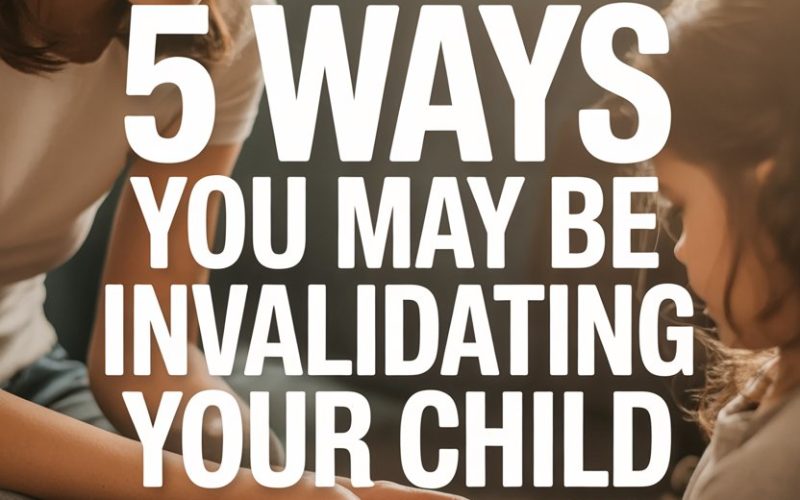Ever found yourself gritting your teeth while your little one loses the plot over the “wrong” colour cup?
Or wondered if you’re somehow messing up because your child seems to erupt over things that make absolutely zero sense to grown-up brains?
Welcome to the glorious world of parenting—where you can accidentally step on emotional landmines before breakfast.
Every parent wants their child to feel heard and valued. Still, even the most loving mums and dads sometimes respond in ways that leave kids feeling dismissed or misunderstood.
The tricky part? Most of us do this without realising, and it rarely looks like what you see in parenting books.
Think of this as a handy guide to five common ways parents accidentally invalidate their children—and, more importantly, how to shift those habits with a little less guilt and a little more laughter.
1. Minimizing Their Feelings (“It’s Not That Bad!”)
A stubbed toe, a lost cuddly toy, or a sibling snatching the last fish finger can feel like the apocalypse in a child’s world.
When you say, “You’re fine,” or “It’s not a big deal,” it might sound reasonable. Grown-ups know the sky isn’t falling because the blue bowl is in the dishwasher.
But to your child, it is a big deal. Children are new to this whole “managing massive feelings” gig.
When their parent skips past the upset to try and fix the mood, it tells them their emotions are too much, too silly, or just plain wrong.
According to Harvard Health, validation doesn’t mean agreeing with your child’s meltdown—it means acknowledging their emotional experience.
Try this instead: Name the feeling and show a sprinkle of empathy. “You’re really upset about the blue bowl, huh? I hear you, it was your favourite for cereal.” Sometimes, that’s all it takes for a meltdown to lose steam.
And when it doesn’t? At least your child knows you’re on their side—blue bowl or not.
2. Rushing to Fix Instead of Listening
Parents are natural problem-solvers. Broken toy? Here’s the super glue. Friendship drama? Let’s text their mum right now.
But when children share something that’s made them sad, angry, or anxious, the knee-jerk “let’s fix it” approach can backfire.
Often, kids aren’t looking for solutions—they’re looking for connection. A child who says, “No one played with me at break,” is not only sharing a problem but also inviting you into their world.
If you immediately leap to “Just ask someone else to play!” you might unintentionally send the message that their feelings are a nuisance best swept away.
Just being present can be enough. Pause. Let your child finish, even if you have a killer fix lined up. Try: “That sounds really hard. Want to talk about it, or do you want a cuddle?”
Sometimes, they will want your advice, but not before they know you truly get it. Dr. John Gottman calls this “emotion coaching”—and research shows it helps kids become more resilient and emotionally intelligent.
3. Dismissing Their Perspective (“You’re Overreacting”)
Parents have decades of life experience. Kids, not so much. The urge to compare your child’s problems to “real life” (aka: bills, traffic, and losing your car keys for the third time this week) is strong.
But when you say things like, “That’s nothing to get worked up about,” or “You’re being dramatic,” you teach your child that their internal world is unreliable—or, worse, ridiculous.
Children are experts at reading between the lines. If you roll your eyes or sigh while they’re upset, they’ll notice.
According to clinical psychologist Dr. Becky Kennedy, validation doesn’t fuel drama; it helps kids process their feelings so they eventually learn to put things in perspective, too.
Challenge yourself to see the world from their angle. “Wow, when you say you’re scared of the dark, you really mean it feels scary, huh?”
This doesn’t mean you have to let the night-light bill soar to astronomical heights, but it does show you respect their feelings—even if you’re secretly thinking about the power bill.
4. Using Shame or Sarcasm as a Motivator
We’ve all been there: the classic, “Big kids don’t cry,” or, “Oh, you’re scared of a tiny spider? Really?”
The temptation to nudge kids out of tricky emotions with a bit of tough love or humour can be hard to resist, especially when you’re running on caffeine and optimism.
Problem is, shame and sarcasm don’t build resilience—they build walls.
Research from the Pediatrics Child Health highlights that children learn best from warmth, clear boundaries, and gentle firmness—not humiliation or mockery.
If you catch yourself starting with, “Don’t be such a baby…”—pause. Try, “I can see you’re feeling big feelings right now. Want to talk about what’s got you upset?”
You can still keep boundaries and expectations, but skip the shame. And yes, your four-year-old might still be petrified of the house spider. (Who can blame them? Those things move fast.)
5. Dismissing Their Interests or Passions
Sometimes it’s just hard to get excited about another hour of Pokémon facts, Fortnite replays, or the six-thousandth drawing of a unicorn.
If you find yourself tuning out or saying, “That stuff doesn’t matter,” you’re not alone. But beware: Dismissing a child’s interests can feel like dismissing them.
Showing even mild curiosity goes a long way. Try asking questions about the game, or volunteer to be the audience for their one-kid puppet show.
Parenting Expert explains that when parents show interest in what their child cares about, kids feel respected and develop self-worth—yes, even if you’d rather be doing literally anything else.
No need to fake wild enthusiasm. “I love how much you know about these dinosaurs! Tell me, what’s the weirdest one?” Two minutes of genuine engagement can be worth more than an hour of distracted agreement.
Parenting with Validation: Your Secret Superpower
Every parent has moments they wish they could take back. (Especially before that first cup of tea kicks in.) The good news: you don’t have to get it right every time.
Children don’t need perfect parents—they need real, human ones who are willing to listen, apologise, and try again.
Validation doesn’t mean you give in to every request or agree with every emotional hurricane. It simply means showing that your child’s feelings are real, even when their logic is a bit questionable.
Tonight, when the bedtime stalling begins or the dinner veggies cause a dramatic swoon, experiment with a little validation. Try naming your child’s feeling, resisting the fix, or asking a curious question about their latest obsession.
You might be surprised by the connection that follows—and who knows, you might even learn to love a good dinosaur fact.
You’re doing better than you think.
And if you slip up? Welcome to the club. There’s always tomorrow—and another cup of tea.





